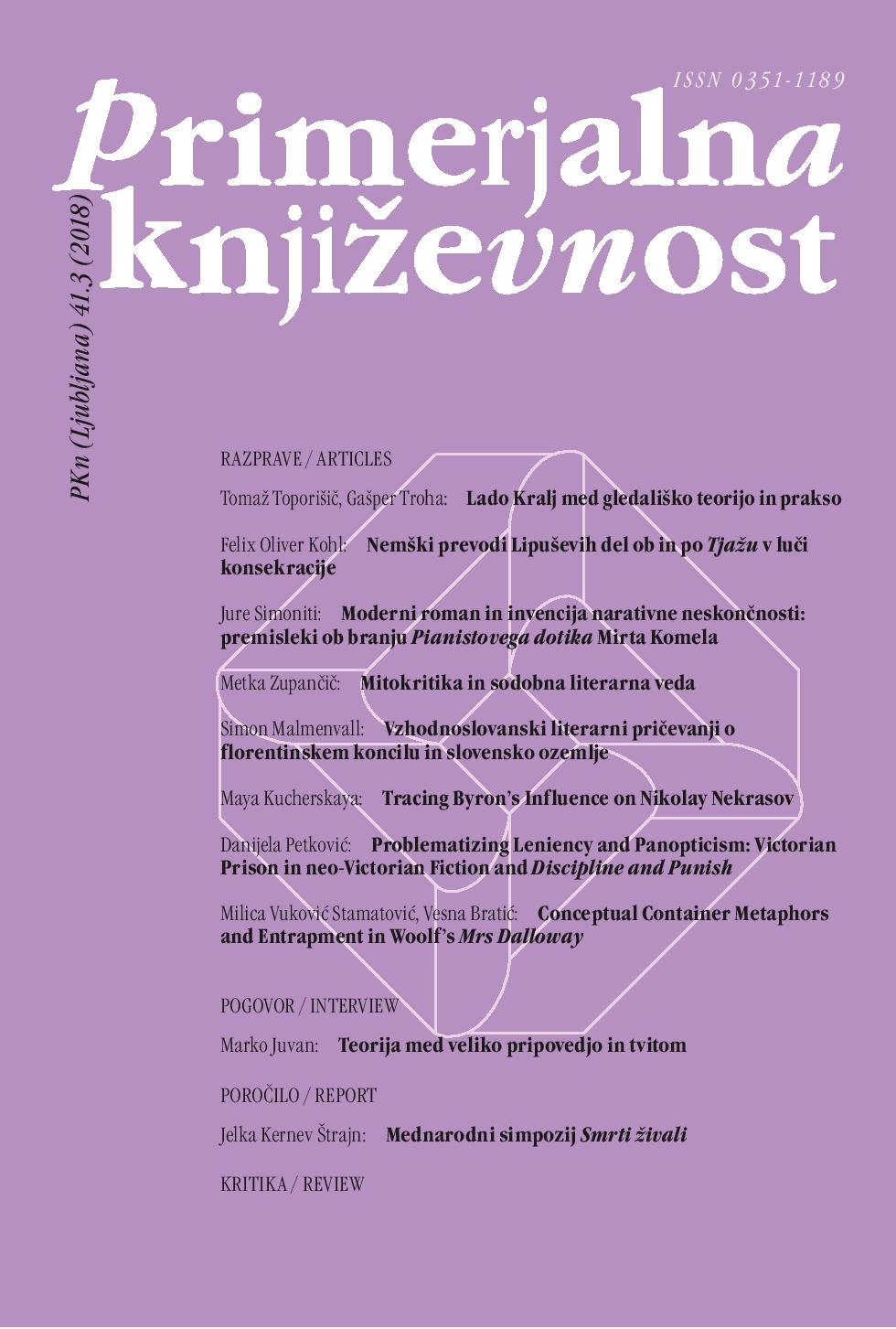The Modern Novel and the Invention of Narrative Infinity: Ruminations after Reading The Pianist’s Touch by Mirt Komel
Keywords:
Slovenian literature, European literature, novel, theory of the novel, Lukács, György, narrative structure, comparative studies, Komel, Mirt, Goethe, Johann Wolfgang von, Flaubert, Gustave, Kafka, Franz, Proust, Marcel, García Márquez, GabrielAbstract
Drawing on a recent Slovenian novel by Mirt Komel Pianistov dotik (The Pianist’s Touch), the article examines the difference between the narrative of the classical European novel, primarily nineteenth-century novel, still being brought to its end, and the increasing impossibility of the twentieth century to devise this kind of “end of the story”. While in the nineteenth century the narrative could still hope to achieve closure, even though mostly in tragic terms for the hero, in the twentieth century the world is rather showed in the process of losing its symbolic structure, the process that condemns the hero to some sort of “narrative infinity”: for instance, to the shame of Josef K. that outlives his own death in Kafka, the incarnation of Time in Proust, the continuation of the drive of speaking in Beckett, or the inability to seize the moment of death in García Márquez. In The Pianist’s Touch, a twenty-first-century novel, even this hindmost difference between the symbolic investiture and the respective falling short of reality collapses, a difference that still interpellated and obliged Kafka’s heroes, which is why Komel’s protagonist can only become an utterly untouchable monument in the midst of a disenchanted world.References
Bahtin, Mihail. Teorija romana. Prev. Drago Bajt. Ljubljana: Cankarjeva založba, 1982.
Beckett, Samuel. Neimenljivi. Prev. Aleš Berger. Maribor: Založba Obzorja, 1989.
Cervantes, Miguel de. Don Kihot. Drugi del. Prev. Niko Košir. Ljubljana: Cankarjeva založba, 1973.
Connolly, Cyril. 100 Key Books of the Modern Movement from England, France and America 1880–1950. London: Allison & Busby, 1986.
Dolar, Mladen. »Kamen in glas – od Hegla do Becketta«. Problemi 45.4–5 (2007): 5–39.
Flaubert, Gustave. Bouvard et Pécuchet. Pariz: Louis Conard, 1910.
García Márquez, Gabriel. Ljubezen v času kolere. Prev. Nina Kovič. Ljubljana: Državna založba Slovenije, 1987.
– – –. Sto let samote. Prev. Alenka Bole Vrabec. Ljubljana: Mladinska knjiga, 1997.
Goethe, Johann Wolfgang von. Učna leta Wilhelma Meistra II. Prev. Štefan Vevar. Ljubljana: Mladinska knjiga, 1998.
Kafka, Franz. Grad. Prev. Jože Udovič. Ljubljana: Cankarjeva založba, 1967.
– – –. Proces. Prev. Jože Udovič. Ljubljana: Založništvo slovenske knjige, 1991.
Komel, Mirt. Pianistov dotik. Novo mesto: Goga, 2015.
Lukács, Georg. Teorija romana. Prev. Tomo Virk. Ljubljana: Literatura, 2000.
Pirjevec, Dušan. »Franz Kafka in evropski roman«. Franz Kafka. Grad. Ljubljana: Cankarjeva založba, 1967. 5–65.
Proust, Marcel. À la recherche du temps perdu VII. Le temps retrouvé II. Pariz: Gallimard, 1927.
– – –. Spet najdeni čas. Iskanje izgubljenega časa VII. Prev. Radojka Vrančič. Ljubljana: Državna založba Slovenije, 1997.
– – –. Ubežnica. Iskanje izgubljenega časa VI. Prev. Radojka Vrančič. Ljubljana: Državna založba Slovenije, 1996.
Virk, Tomo. »Proti ‘napačnemu branju’«. Primerjalna književnost 24.3 (2001): 279–289.
Voltaire. Kandid ali optimizem. Prev. Oton Župančič. Ljubljana: Cankarjeva založba, 1975.


